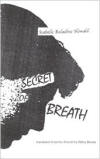Secret of Breath
In one of the early poems of Isabella Baladine Howald’s haunting new collection, Secret of Breath, the poet writes, “What I love is not seeing, but the effort of seeing.” This untitled poem’s opening line could easily serve as the book’s Ars Poetica: Howald relentlessly self-interrogates as she scrutinizes the philosophical meaning behind her lover’s/husband’s death (it’s never quite specified who exactly died) – and, by extension, life.
In one of the early poems of Isabella Baladine Howald’s haunting new collection, Secret of Breath, the poet writes, “What I love is not seeing, but the effort of seeing.” This untitled poem’s opening line could easily serve as the book’s Ars Poetica: Howald relentlessly self-interrogates as she scrutinizes the philosophical meaning behind her lover’s/husband’s death (it’s never quite specified who exactly died) – and, by extension, life.
Unlike the countless elegies in contemporary poetry, these poems stand out in that they try to understand and articulate grief in the most austere terms possible. This book is not a litany of personal anecdotes or specific concrete details. There are no prosodic adornments or narrative flourishes. Instead, Howald wastes no time diving straight into the emotional and intellectual moment. Most poems run under fifteen lines, and there are many one to three line poems. The result of this economy is a highly distilled, emotional intensity; upon finishing many of the poems, I was often left feeling devastated yet somehow transformed.
Secret of Breath occupies two different worlds. On one hand, these lyrical poems are highly physical. Some poems describe her dying love’s body. Others depict barren natural landscapes. And others, of course, blend the body and land together:
To date, war everywhere,
the fields, the forests of birch trees,
the wind, the grass, the low light,
the earth is plundered and the bodies abandoned.
They change the name of countries,
they no longer even know from what. Or of whom they speak
and here we are at these gaping borders.
First, it should be noted that throughout the book, stanzas are set off with large amounts of white space (which may not be evident in the citations of this review). In fact, some poems (particularly the one-liners) start off at the bottom of the page. This is not a gimmick. The book hinges on silence and the white of the page gives that silence a tactile presence, such as in the aforementioned poem where the whitespace actually creates starkness. Moreover, the landscape’s particular details vacillate between general and specific: “fields,” “wind,” “grass,” and “war” could happen anywhere. Yet, when “forests of birch trees” and “low light” enter the mix – the barest of descriptions – I’m in Central Europe and it is winter.
Instead of furthering the narrative, Howald elects to finish the poem with larger, emotional intensity. We never learn who is “they” (border guards, army generals, politicians?). We have no idea where these borders are. But if the reader asks these questions, they-re completely off the mark. Time and again, Secret of Breath moves from the actual to the metaphysically raw moment, often with deceptively remarkable ease.
Yet, these poems are not just ones of landscape and body. Despite its ostensible accessibility, Secret of Breath is at its heart a highly personalized and urgent philosophical investigation. The poet Karl Shapiro once claimed that philosophy and poetry were naturally antithetical to one another: the language of philosophy, Shapiro posited, was static, whereas poetry’s language was open and somewhat mysterious. Howald turns this argument on its head time and again, by placing broad, often abstract language within the confines of highly compressed syntax:
No longer pushing away the obsession.
Seeking. Like an exploration, slow, diligent, desperate,
looks, face, bodies.
Repeating in front of this face and this body:
“There is something, there is something”.
On one hand, this poem shouldn’t work. The language is not particularly evocative. If there is an image, it’s threadbare and non-descript. Mostly, the poem is direct statement (although as someone who doesn’t speak a lick of French, I wonder if this same quality exists in the poem’s original language). Yet, it’s the grammatical oddities of this poem – and almost all the poems in this book really – that gives this poem its vitality and uniqueness. First, there is no subject, which in turn indicates to the reader that s/he is dropping in on an internal argument. Second, consider the poetic effect of the grammar in the second stanza: the reader moves from generalized abstractions to nouns within the comma chain. By throwing the grammar, the reader is seeing a mind – a desperate one – at work. And in this way, we’re located not in the world of generalized ideas, but in the world of intellect and emotions, a world where things contradict and no easy answers exist.
At the end of the day, this book – through all its grief-filled intellections – never posits any real answer to its relentless searching. In fact, the final book of the poem posits:
Always: “I don’t know,”
ignorant what it’s all about
– to some extent death has already started.
Not to recognize this noise,
or this step, or a friction, a sliding,
or from where it comes.
Perhaps there isn’t any noise.
We all, of course, are in the process of dying, and are always ruminating about our own and loved ones’ ends. But these ruminations bring us no closer to understanding mortality. We end where we begin: in unknowing. Yet, after reading Secret of Breath, one feels more at peace with this uncertainty, and oddly, much wiser.





